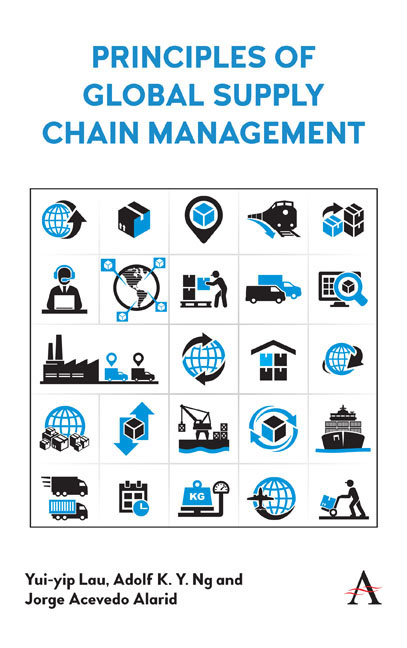Book contents
- Frontmatter
- Contents
- List of Figures
- List of Tables
- Foreword
- Preface
- About the Authors
- 1 Introduction
- 2 Managing Outbound Logistics and Distribution
- 3 Supplier Selection and Procurement
- 4 Warehouse Management
- 5 Case Studies in Food Supply Chains
- 6 Inland Ports in Global Supply Chains
- 7 Climate Change in a Global Environment
- 8 Sustainability in Infrastructure-Based Supply Chains
- 9 Reverse Logistics
- 10 Logistics Associations
- 11 Logistics Education
- 12 Case Exercises in Global Supply Chains
- Appendix
- Index
8 - Sustainability in Infrastructure-Based Supply Chains
- Frontmatter
- Contents
- List of Figures
- List of Tables
- Foreword
- Preface
- About the Authors
- 1 Introduction
- 2 Managing Outbound Logistics and Distribution
- 3 Supplier Selection and Procurement
- 4 Warehouse Management
- 5 Case Studies in Food Supply Chains
- 6 Inland Ports in Global Supply Chains
- 7 Climate Change in a Global Environment
- 8 Sustainability in Infrastructure-Based Supply Chains
- 9 Reverse Logistics
- 10 Logistics Associations
- 11 Logistics Education
- 12 Case Exercises in Global Supply Chains
- Appendix
- Index
Summary
To maintain sustainable competitive advantage, logistics organizations design and implement sustainable infrastructure- based supply chains. The competitiveness of logistics is reflected in its ability to optimize the supply chain process in a cost- effective manner. In this chapter, we will achieve the following objectives:
• explain the concept of sustainable infrastructure-based supply chains;
• learn about the Holistic Vision Model® and Holistic Infrastructure Model in the management of global supply chains; and
• identify role and cost of infrastructure in the supply chain.
Introduction
Infrastructure by itself does not generate value. Logistics platforms, industrial zones and industrial parks were, and still are, one of the main instruments, in terms of cost and effectiveness, to promote the development of industry in growing economies, as well as to promote the economic development of rural and peripheral regions. However, the results depend on a set of internal and external factors that determine the growth of these developments, so it is expected that when some of these are not available in the necessary conditions, the achievements will be minimal compared to the high levels of investment, and even poor results may imply higher costs, mainly for businesses and governments.
In this context, when industrial and logistics infrastructure is developed that do not qualify the minimum requirements nor has the urban industrial equipment, it is possible that it cannot significantly influence the level of industrialization of a country, slowing down industrial production, even when the economies of agglomeration benefit the gradual establishment of new companies and investments. Thus, industrial infrastructure, logistics and associated services must meet certain localization factors, economic and extra- economic, capable not only of attracting companies, but retaining them and promoting their full development. Indeed, much of the world's poverty is due to inadequate access to opportunities, development, hopes and dreams, due to limited access to infrastructure and a highly vulnerable environment.
The global economy is experiencing a dynamism and volatility that puts investment at risk for the growth, strengthening and development of necessary infrastructure, which guarantees the demands for basic services, competitive supply chains and the sustainability of the environment.
- Type
- Chapter
- Information
- Principles of Global Supply Chain Management , pp. 115 - 128Publisher: Anthem PressPrint publication year: 2019



